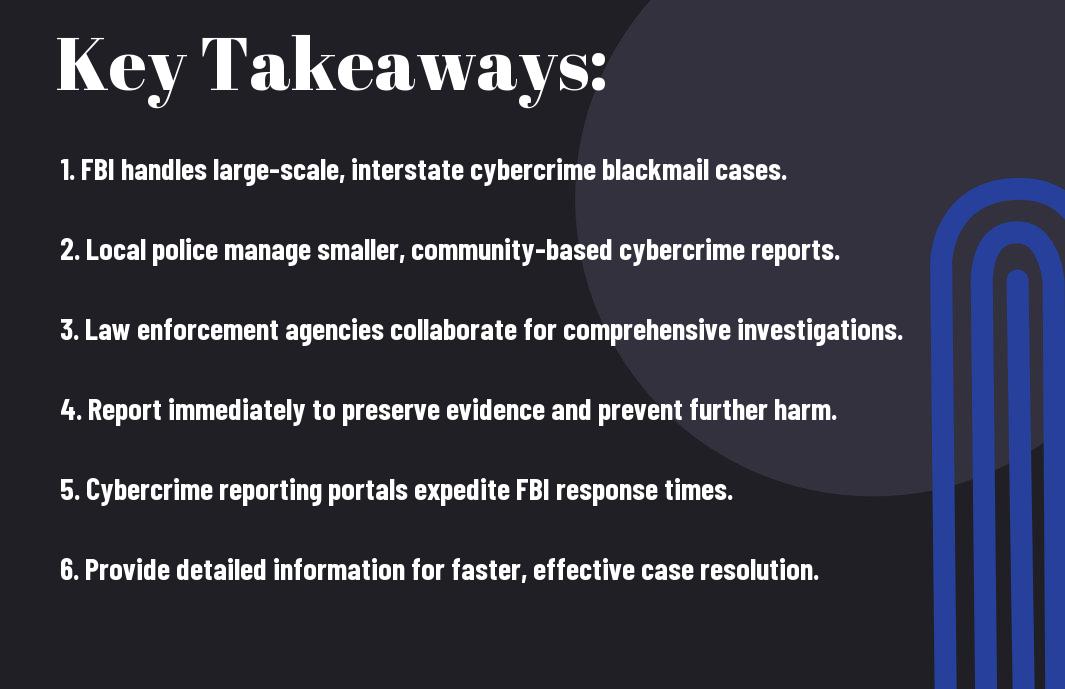Over the growing threat of cybercrime blackmail, knowing where to report these incidents is crucial for your safety and resolution. You might find yourself unsure whether to approach local police, FBI, or other law enforcement agencies. Each has specific roles and capabilities, and understanding these can significantly impact how your case is handled. In this post, you will learn the distinctions between these entities and what to expect when you file a report, empowering you to make informed decisions when faced with cyber threats. Digital Forensic Squad will assist you with where to report cybercrime blackmail.

Key Takeaways:
- Evaluate the severity of the blackmail incident: For serious cases involving threats of harm or potential loss of large sums of money, it is recommended to report to the FBI as they handle federal cybercrime cases.
- Local law enforcement can be a suitable option for reporting blackmail that affects individuals or organizations in a specific area. They can provide immediate assistance and investigative support.
- Online platforms often provide specialized reporting channels for cybercrime. Consider reaching out to relevant agencies or services that focus on online criminal activities in addition to law enforcement.
Understanding Cybercrime Blackmail
Your awareness of cybercrime blackmail is necessary in the digital age. This crime typically involves a perpetrator threatening to disclose sensitive information unless a ransom is paid. Cybercriminals often prey on individuals and organizations, exploiting fears and vulnerabilities for financial gain.
Definition and Types of Cyberblackmail
Any understanding of cyberblackmail begins with defining its various forms:
| Definition | Types |
| Threats to disclose private information | Sextortion |
| Manipulating victims with false claims | Phishing schemes |
| Blackmail via hacking | Ransomware attacks |
| Coercing individuals to pay | Camming blackmail |
Recognizing the different forms of cyberblackmail can empower you to protect yourself against these threats.
Common Tactics Used by Cybercriminals
Tactics employed by cybercriminals are often manipulative and sophisticated, designed to instill fear and urgency. They may use social engineering, leverage emotional triggers, and employ fake personas to convince victims of their authenticity.
At the core of these strategies is a deliberate manipulation of your trust and fear. Cybercriminals may present themselves as authorities, claim to possess incriminating evidence, or threaten to release damaging content if their demands aren’t met. Being informed about these tactics is vital. Remaining vigilant and skeptical of unsolicited communications can significantly reduce your risk of falling victim to such scams.

Reporting to Law Enforcement
The first step in tackling cybercrime blackmail is to contact law enforcement. They are equipped to investigate such crimes and can collaborate with other agencies if necessary. Your report can help initiate investigations, as well as tracking and apprehending perpetrators, which is vital in combating cybercrime on a larger scale. Don’t hesitate to reach out to them if you find yourself a target of blackmail.
When to Contact Local Police
One reason to contact local police is when you receive threats, or your personal information is compromised, and you feel your safety is at risk. If you believe the situation is escalating or involves threats of physical harm, local law enforcement should be your first point of contact.
Information to Provide During Reporting
At the time of reporting, provide comprehensive details about the incident. This includes any messages, emails, or screenshots from the blackmailer, as well as the timeline of events. Additionally, include any personal information about the offender you may have, such as usernames or profiles they used to contact you.
Reporting involves documenting all aspects of your experience. Providing the police with digital evidence such as screenshots, emails, and text messages will help substantiate your case. Clearly outline dates and times of communications and any threats made against you. The more precise your information is, the better chance law enforcement has to take effective action. Every detail play a significant role in prosecution and in ensuring your safety.
Involvement of the FBI
Not every cybercrime case requires the FBI’s intervention; however, their involvement can be necessary in serious situations that extend beyond local law enforcement’s capabilities. You should consider escalating your case to the FBI if it involves significant losses, interstate transportation of fraud, threats against national security, or intricate criminal organizations. The FBI is equipped to deal with more extensive investigations and can provide resources that local authorities might lack.
Situations Requiring FBI Engagement
With increasing threats from sophisticated cybercriminals, it’s vital to recognize when to involve the FBI. If you’re facing cyber extortion, hacking incidents that target federal systems, or cases that affect multiple states, you should promptly report it to the FBI. Timely engagement with the FBI can lead to more effective measures and a higher chance of apprehending the perpetrators.
How the FBI Handles Cybercrime Cases
Before the FBI can take action on your report, they will assess the case’s severity and the potential for cooperation with local law enforcement agencies. They prioritize cases based on threat levels, available resources, and immediate impact on the public. If they determine your case warrants further action, they will launch a formal investigation.
In addition, the FBI utilizes sophisticated technology and a trained workforce to track cybercriminals and analyze cases effectively. You can expect them to collaborate with other agencies and share information that can enhance the chances of arresting offenders. Their focus on cybersecurity means they understand the dynamic nature of cyber threats and employ advanced techniques to dismantle illegal operations, ensuring that they can respond adequately to your concerns and enhance digital safety overall.
Local Police vs. FBI: Key Differences
Unlike local police, the FBI operates on a federal level, allowing it to engage in investigations that extend across state lines. Local police typically address crime within specific jurisdictions, focusing on community issues. This means that if your cybercrime case involves multiple states or complex networks, the FBI might be the more effective agency to contact.
Jurisdictional Limits
Differences in jurisdiction are significant when it comes to reporting cybercrime. Local police can only take action within their specific area, while the FBI has the authority to handle cases that span multiple jurisdictions, potentially impacting you if the crime crosses state lines.
Resources and Expertise
Below local law enforcement, the FBI is equipped with advanced technology and specialized units, which allows for a more comprehensive approach to cybercrime. If your situation involves complex cyber threats, the FBI can bring in experts that local police might not have access to.
To further illustrate, the FBI typically has access to cutting-edge forensic tools and a network of cyber experts who specialize in various cybercrime facets. This level of expertise can be critical in tackling sophisticated cybercrimes, ensuring a more thorough investigation. Should you decide to report your case to the FBI, you can expect a level of professionalism and resources that local police may not possess, particularly in handling cases that require extensive technological knowledge.
Protecting Yourself from Cyberblackmail
After experiencing cyberblackmail, it’s crucial to prioritize your safety and well-being. You can take proactive measures to safeguard your information and prevent potential incidents. Familiarize yourself with cybersecurity protocols, such as regularly updating passwords and being cautious about what personal information you share online. Creating a support network and knowing the warning signs of blackmail can also empower you to act swiftly if targeted.
Preventive Measures
Measures such as using two-factor authentication and secure passwords can greatly strengthen your online safety. Educate yourself and your friends about not sharing sensitive content online and using privacy settings on social media platforms. Regularly audits of your digital footprint can help you identify vulnerabilities in your online presence to minimize risks.
Steps to Take if Targeted
Along with remaining calm, the first step you should take when targeted by cyberblackmail is to document everything. Save screenshots, emails, and messages, as these can serve as crucial evidence when reporting the incident. Avoid engaging with the blackmailer, as this could encourage further threats. Instead, report the incident to the appropriate authorities and seek support from loved ones to navigate the emotional impact.
Also, keep in mind that it’s vital to reach out to law enforcement or cybercrime units to report the blackmail. You may also choose to consult with a legal professional who specializes in cybercrime, which can help you understand your rights and options moving forward. Don’t hesitate to lean on trusted friends or family members; their support can be invaluable during such trying times. Above all, stay vigilant and continuously bolster your online security to avert future threats.
Summing up
Considering all points, when you encounter cybercrime blackmail, it is vital to assess the type of threat you are facing to determine where to report it. Law enforcement, the FBI, or local police may be appropriate depending on the severity and nature of the crime. Ensuring your reports are directed to the correct agency will help in addressing the situation more effectively.
Q: How do I decide whether to report to the FBI or local law enforcement?
A: The choice between reporting to the FBI or local law enforcement often depends on the nature and scale of the cybercrime. If the blackmail involves threats that cross state lines, extensive fraud, or appears to be part of a larger cybercrime ring, it may be more appropriate to report to the FBI. On the other hand, if the crime is localized or involves a personal acquaintance, your local police might be more equipped to handle the situation promptly. It’s acceptable to report to both agencies simultaneously if you’re uncertain about the jurisdiction.
Q: What can I expect after reporting a cybercrime blackmail incident?
A: After you report a cybercrime blackmail incident, law enforcement or the FBI will typically initiate an investigation. They may contact you for additional information and updates on the case. The response time can vary significantly based on the complexity of the case and the resources available to the agency. While law enforcement may not always provide feedback on the outcome due to privacy concerns, they will guide you on how to protect yourself from further incidents and may advise on legal steps you can take moving forward.
Resources:
1. For broader jurisdictional issues, you can file a complaint with the Home Page – Internet Crime Complaint Center (IC3).

